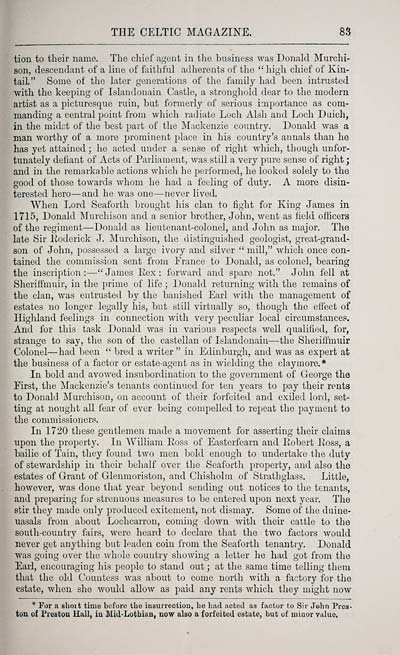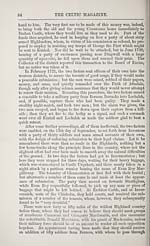Blair Collection > Celtic magazine > Volume 4
(93)
Download files
Complete book:
Individual page:
Thumbnail gallery: Grid view | List view

THE CELTIC MAGAZINE. 85
tion to their name. The chief agent in the business was Donakl Murchi-
son, descendant of a lino of faithful adherents of the "high chief of Kin-
tail." Some of the later generations of the family had been intrusted
with the keeping of Islandonain Castle, a stronghold dear to the modern
artist as a picturesque ruin, but formerly of serious importance as com-
manding a central point from which radiate Loch Alsh and Loch Duich,
in the midct of the best part of the Mackenzie country. Donald was a
man worthy of a more prominent place in his country's annals than ho
has yet attained ; lie acted under a sense of right which, though unfor-
tunately dehant of Acts of Parliament, was still a very pure sense of right ;
and in the remarkable actions which he performed, he looked solely to the
good of those towards whom he had a feeling of duty. A more disin-
terested hero — and he was one — never lived.
When Lord Seaforth brought his clan to fight for King James in
1715, Donald TMurchison and a senior brother, John, went as field officers
of the regiment — Donald as lieutenant-colonel, and John as major. The
late Sir Eodcrick J. Murchison, the distinguished geologist, great-grand-
son of John, possessed a large ivory and silver " mill," which once con-
tained the commission sent from Erance to Donald, as colonel, bearing
the inscription : — " James Eex : forward and spare not." John fell at
Sheriffmuir, in the prime of life ; Donald returning with the remains of
the clan, was entrusted by the banished Earl with the management of
estates no longer legally his, but still virtually so, though the eflect of
Highland feelings in connection with very peculiar local circumstances.
And for this task Donald was in various resjDccts well qualified, for,
strange to say, the son of the castellan of Islandonain — the Sheriffmuir
Colonel — had been " bred a writer " in Edinburgh, and was as expert at
the business of a factor or estate-agent as in wielding the claymore.*
In bold and avowed insubordination to the government of George the
First, the Mackenzie's tenants continued for ten years to pay their rents
to Donald Murchison, on account of their forfeited and exiled lord, set-
ting at nought all fear of ever being compelled to repeat the payment to
the commissioners.
In 1720 these gentlemen jnade a movement for asserting their claims
upon the property. In William Eoss of Easterfearn and Eobert Ross, a
bailie of Tain, they found two men bold enough to undertake the duty
of stewardship in their behalf over the Seaforth property, and also the
estates of Grant of Glenmoriston, and Chisholm of Strathglass. Little,
however, was done that year beyond sending out notices to the tenants,
and preparing for strenuous measures to be entered upon next year. The
stir they made only produced exitement, not dismay. Some of the duine-
uasals from about Lochcarron, coming down Avith their cattle to the
south-country fairs, were heard to declare that the two factors would
never get anything but leaden coin from the Seaforth tenantry. Donald
was going over the whole country showing a letter ho had got from the
Earl, encouraging his people to stand out; at the same time telling them
that the old Countess was about to come north Avitli a factory for the
estate, when she would aUow as paid any rents which they might now
* For a sboit time before the insurrection, be bad acted as factor to Sir John Pres-
ton of Preston Hall, in Mid-Lothian, now also a forfeited estate, but of minor value.
tion to their name. The chief agent in the business was Donakl Murchi-
son, descendant of a lino of faithful adherents of the "high chief of Kin-
tail." Some of the later generations of the family had been intrusted
with the keeping of Islandonain Castle, a stronghold dear to the modern
artist as a picturesque ruin, but formerly of serious importance as com-
manding a central point from which radiate Loch Alsh and Loch Duich,
in the midct of the best part of the Mackenzie country. Donald was a
man worthy of a more prominent place in his country's annals than ho
has yet attained ; lie acted under a sense of right which, though unfor-
tunately dehant of Acts of Parliament, was still a very pure sense of right ;
and in the remarkable actions which he performed, he looked solely to the
good of those towards whom he had a feeling of duty. A more disin-
terested hero — and he was one — never lived.
When Lord Seaforth brought his clan to fight for King James in
1715, Donald TMurchison and a senior brother, John, went as field officers
of the regiment — Donald as lieutenant-colonel, and John as major. The
late Sir Eodcrick J. Murchison, the distinguished geologist, great-grand-
son of John, possessed a large ivory and silver " mill," which once con-
tained the commission sent from Erance to Donald, as colonel, bearing
the inscription : — " James Eex : forward and spare not." John fell at
Sheriffmuir, in the prime of life ; Donald returning with the remains of
the clan, was entrusted by the banished Earl with the management of
estates no longer legally his, but still virtually so, though the eflect of
Highland feelings in connection with very peculiar local circumstances.
And for this task Donald was in various resjDccts well qualified, for,
strange to say, the son of the castellan of Islandonain — the Sheriffmuir
Colonel — had been " bred a writer " in Edinburgh, and was as expert at
the business of a factor or estate-agent as in wielding the claymore.*
In bold and avowed insubordination to the government of George the
First, the Mackenzie's tenants continued for ten years to pay their rents
to Donald Murchison, on account of their forfeited and exiled lord, set-
ting at nought all fear of ever being compelled to repeat the payment to
the commissioners.
In 1720 these gentlemen jnade a movement for asserting their claims
upon the property. In William Eoss of Easterfearn and Eobert Ross, a
bailie of Tain, they found two men bold enough to undertake the duty
of stewardship in their behalf over the Seaforth property, and also the
estates of Grant of Glenmoriston, and Chisholm of Strathglass. Little,
however, was done that year beyond sending out notices to the tenants,
and preparing for strenuous measures to be entered upon next year. The
stir they made only produced exitement, not dismay. Some of the duine-
uasals from about Lochcarron, coming down Avith their cattle to the
south-country fairs, were heard to declare that the two factors would
never get anything but leaden coin from the Seaforth tenantry. Donald
was going over the whole country showing a letter ho had got from the
Earl, encouraging his people to stand out; at the same time telling them
that the old Countess was about to come north Avitli a factory for the
estate, when she would aUow as paid any rents which they might now
* For a sboit time before the insurrection, be bad acted as factor to Sir John Pres-
ton of Preston Hall, in Mid-Lothian, now also a forfeited estate, but of minor value.
Set display mode to: Large image | Transcription
Images and transcriptions on this page, including medium image downloads, may be used under the Creative Commons Attribution 4.0 International Licence unless otherwise stated. ![]()
| Early Gaelic Book Collections > Blair Collection > Celtic magazine > Volume 4 > (93) |
|---|
| Permanent URL | https://digital.nls.uk/76553438 |
|---|
| Description | Volume IV, 1879. |
|---|---|
| Shelfmark | Blair.5 |
| Attribution and copyright: |
|
| Description | A selection of books from a collection of more than 500 titles, mostly on religious and literary topics. Also includes some material dealing with other Celtic languages and societies. Collection created towards the end of the 19th century by Lady Evelyn Stewart Murray. |
|---|
| Description | Selected items from five 'Special and Named Printed Collections'. Includes books in Gaelic and other Celtic languages, works about the Gaels, their languages, literature, culture and history. |
|---|

